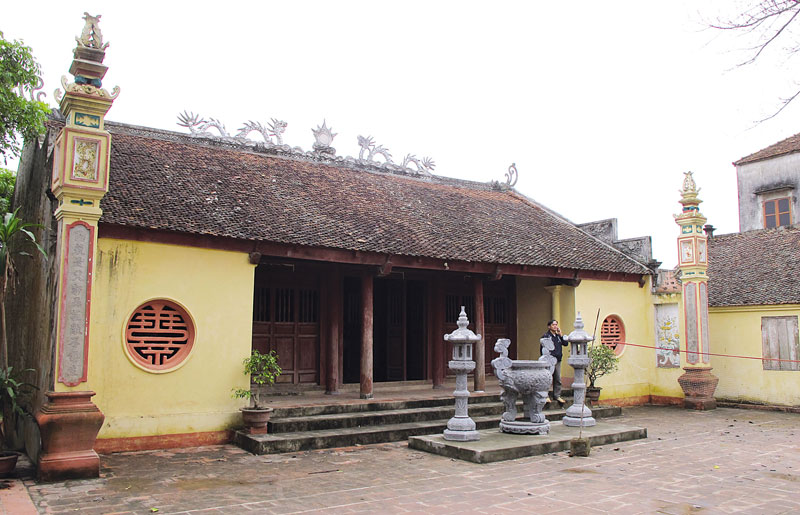Typical historical - cultural celebrity of Bac Ninh people in Nguyen Dynasty (XIX - XX centuries) (part1)
Nguyen Dynasty - the last feudal dynasty in Vietnamese history, existed for 143 years (1802-1945) with 13 Nguyen kings. The Nguyen Dynasty was also a dynasty that marked many ups and downs in Vietnamese history, especially the invasion of the French in the mid-19th century. During this period, Bac Ninh - Kinh Bac prided themselves on having children who had brought their children. Names: Cao Ba Quat, Nguyen Cao, Nguyen Quyen, Vu Trinh, Hoang Van Hoe, Nguyen Dang So - the typical historical and cultural celebrities of the nation and the homeland of Bac Ninh.

Temple of Nguyen Cao in Cach Bi village, Cach Bi commune, Que Vo district, Bac Ninh province (Source - Internet)
1. Cao Ba Quat (1809 - 1854)
Cao Bat Quat was born in Phu Thi village, Gia Lam district, Bac Ninh province. From 1962, Gia Lam district was cut and moved to Hanoi city.
Cao Bat Quat is a descendant of Cao Ba Hien, who worked as a Minister of Infantry in the Late Le Dynasty. His father, Cao Ba Thieu, was a talented contemporary, twin brother of Cao Ba Dat, famous for literature.
When he was small, Cao Ba Quat was famous for his intelligence and excellence. In 1832, Cao Ba Quat attended Hoi examination for many times but he could not pass because of violating examination regulations. Legend has it that, in an examination paper of Cao Ba Quat, there were often 4 forms of writing as Chan, Thao, Trien, Le, so he often failed.
Cao Ba Qua’s talent did not go unnoticed. Ater 10 years of consecutive failures, Cao Ba Quat was called to the capital Hue. By the recommendation of Bac Ninh Province's governor, Cao Bao Quat was appointed as a low-rank mandarin in the Ministry of Rites and became the primary examiner in the Thua Thien Examination Compound. He held that position for a short period of time; while marking exam papers that held potential, Cao Bao Quat had adjusted their content as they contained tabooed names. This information was disclosed and Cao Bao Quat lost his post and exiled to Da Nang. After his mission to Singapore led by Dao Tri Phu, Cao Bá Quát was rehabilitated and earned the position of Agency Director at the Court. In 1847, he was invited to the Academy of Hue Court
In the year of the Tiger (1854), Cao Ba Quat was transferred to Son Tay as a teacher of Quoc Oai government. Here, he indignantly abandoned the mandarin, acting as a military advisor for Le Duy Cu to start an army against the court. The uprising failed, Cao Ba Quat was captured and executed by the court along with his two sons, Cao Ba Phung and Cao Ba Phong.
Although taking part in the mandarinate, Cao Ba Quat was still poor and he lived in a cottage with worn-out clothes. He was truly sympathized with down-and-out people. With very upright, chivalrous and intelligent personality, Cao Ba Quat chose for himself the “eccentric” lifestyle, which was against flatters and humbles of many mandarins at the time.
Legend has it that Cao Ba Quat used his poetry talents to sharply insult a village mayor who always take advantage of the poor.
Cao Bat Quat is a typical historical and cultural celebrity of the nation and homeland of Bac Ninh in the 19th century.
2. Vu Trinh (1751 – 1827)
Vu Trinh is the eldest son of Vu Thieu, grandson of Doctor Quoc Tu Giam Teu Vu Mien - a famous family of studious and academic traditions of Ngoc Quan village, now in Lam Thao commune, Luong Tai district, Bac Ninh province.
Vu Trinh is famous for being smart and studious. At the age of 17, he passed Huong Cong, was appointed to the position of Trieu Quoc Oai, and then was promoted to the position of Huu Tham branch of the Ministry of Pictures.
When the Le Dynasty died, in the Tay Son Dynasty and then the Nguyen Dynasty came to replace, Vu Trinh retreated to live in seclusion. Later, he was summoned by King Gia Long to be a mandarin for the Nguyen Dynasty.
With profound knowledge, Vu Trinh made many contributions to the Nguyen Dynasty and was sent to the Qing Dynasty. He was praised for his extensive education, exemplary literature.
In his literary career, Vu Trinh is a talented writer who has left many works of typical value such as: the collection of poems "Su yeu", "Cung oan”
Notably, Vu Trinh is the brother-in-law of the great poet Nguyen Du. He is also the person Nguyen Du trusted to read, comment and critique his famous work of Tales of Kieu.
Vu Trinh is considered by researchers as a famous cultural house of Bac Ninh - Kinh Bac in the late 18th century and early 19th century.






